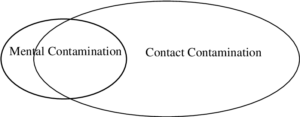Mental contamination OCD, also known as obsessive-compulsive disorder (OCD), is a condition that affects people of all ages. People with this condition often feel the need to perform rituals or compulsions in order to relieve their anxiety. In this blog post, we will discuss what mental contamination OCD is, the symptoms, and how you can treat it!
Contents
What Is Mental Contamination OCD?
 Mental contamination OCD is a type of obsessive-compulsive disorder (OCD) that involves intrusive thoughts, images, and sensations about being contaminated by germs and other external sources. This can lead to a range of unwanted behaviors that helps the individual cope with their fear. Such as washing or sanitizing their hands excessively and avoiding contact with people or items that they perceive as contaminated.
Mental contamination OCD is a type of obsessive-compulsive disorder (OCD) that involves intrusive thoughts, images, and sensations about being contaminated by germs and other external sources. This can lead to a range of unwanted behaviors that helps the individual cope with their fear. Such as washing or sanitizing their hands excessively and avoiding contact with people or items that they perceive as contaminated.
Mental contamination OCD may also know as “pure OCD” or “mental contamination.” It is distinct from traditional forms of OCD, which tend to focus on the fear of physical contamination and compulsive cleaning rituals. Mental contamination can cause significant distress and social awkwardness, as well as interfere with everyday functioning.
Therefore, it is important to recognize the signs and symptoms of this condition in order to seek help. With the right and professional treatment, individuals can learn to manage their symptoms and reduce the distress associated with this disorder.
What Are Some Signs And Symptoms?
When it comes to mental contamination OCD, the signs and symptoms vary greatly from person to person. Common signs and symptoms may include:
- Compulsive hand washing
It is one of the most common signs of OCD. People with this obsession may wash their hands excessively times due to fear of contamination or they may take long showers in order to avoid becoming contaminated.
- Obsessive checking
This involves repetitively checking things like locks and stove knobs to make sure they are secure, fearing that something bad could happen if they left them unchecked.
- Excessive cleaning and disinfecting
People with OCD may excessively clean their homes in order to avoid contamination or they may use strong-smelling chemicals to keep things “clean.” They may also change their clothes multiple times a day due to fears of being contaminated.
- Avoidance of contamination sources
Many people with OCD may avoid going to certain places, such as public restrooms or parks, where they fear contamination. They may also avoid touching certain objects for fear of contamination.
- Intense fear of becoming sick
This can be a sign of OCD. People may have an irrational fear that they will become sick if they come in contact with any type of contamination, even if it has been proven to be harmless.
- Ritualistic behaviors to prevent contamination
Finally, people with OCD may develop rituals to help them prevent contamination. For example, they may take a certain route to avoid exposure to contaminated areas or take specific steps each time they enter their homes in order to avoid bringing any type of contamination into the home.
All of these signs and symptoms can vary in severity from person to person. But if you or someone you know is experiencing any of these signs and symptoms, it may be time to seek help from a mental health professional.
How Common Is Mental Contamination OCD?
 This is an extremely common form of OCD. It’s estimated that over 40% of people with OCD have mental contamination obsessions. Many people may not even be aware that they suffer from this type of OCD. As it is often subtle and harder to recognize than some of the other more well-known types of OCD.
This is an extremely common form of OCD. It’s estimated that over 40% of people with OCD have mental contamination obsessions. Many people may not even be aware that they suffer from this type of OCD. As it is often subtle and harder to recognize than some of the other more well-known types of OCD.
Mental contamination OCD can affect anyone regardless of age, gender, or background. It can be difficult to recognize because it is often mistaken for normal worrying and fear of germs. People with this condition often have difficulty managing their anxiety.
All in all, it is important for you to know that mental contamination OCD is a real and common condition that affects many people. It can be difficult to recognize and manage but with the right treatment, it can be managed.
What Causes Mental Contamination OCD?
Usually, the exact cause of mental contamination OCD is unknown, however, there are some factors that may increase the risk. These include:
- Biological Factors: Abnormalities in certain areas of the brain have been linked to symptoms of OCD. Chemical imbalances in neurotransmitters such as serotonin and dopamine can also lead to an increased risk.
- Environmental Factors: Stressful or traumatic experiences can be a trigger, as well as environmental factors such as viruses, toxins, and allergies.
- Genetic Factors: Studies have suggested that this condition may be hereditary in some cases. Research shows that if one identical twin has OCD then the other is likely to develop it too.
- Personality Factors: People who have an anxiety disorder, or are overly perfectionists, may be more prone to developing mental contamination OCD.
- Cognitive Factors: Negative thought patterns and distorted beliefs can lead to the development of this type of OCD. Thoughts such as “I must be completely clean” or “I’m not worthy of being clean” can cause severe anxiety and fear.
In addition to these certain causes, there are some triggers that can make symptoms worse. These triggers can include certain smells, sights, or places that the person associates with contamination. Triggers may also be related to fear of judgment from others and worry of not being good enough.
No matter what the cause is, it’s important to remember that mental contamination OCD can be treated successfully. You just need to reach out to a mental health professional who can provide an appropriate diagnosis and treatment plan. With the right help, you can learn how to manage your symptoms and take control of your mental health.
How Is Mental Contamination OCD Treated?
 There are various treatments available for mental contamination OCD, depending on the severity of symptoms. Some common options might include:
There are various treatments available for mental contamination OCD, depending on the severity of symptoms. Some common options might include:
- Cognitive-behavioral therapy (CBT): This type of talk therapy provides strategies to identify and change unhelpful thoughts and behaviors related to mental contamination OCD. CBT helps individuals understand how their thoughts, feelings, and behavior affect one another and ultimately shape the way they experience the world.
- Exposure and response prevention (ERP): ERP is a type of CBT that includes gradually exposing yourself to situations that make you anxious while training your brain to not react in the same way it used to. During this process, individuals learn how to remain calm and accept their anxiety instead of reacting in fear or panic.
- Relaxation techniques: Relaxation techniques, such as deep breathing, progressive muscle relaxation, and mindfulness meditation, can help individuals manage their anxiety.
- Medications: There are a few medications that may be used to treat mental contamination OCD. These include antidepressants such as selective serotonin reuptake inhibitors (SSRIs), which help reduce symptoms of depression and anxiety.
In addition to the above treatments, it is important to practice self-care and stay connected with supportive friends and family members. Getting adequate sleep and eating a healthy diet can also help improve mental health. Finally, talking with a mental health professional can be beneficial in managing symptoms of mental contamination OCD.
With all these treatments, it is important to remember that recovery from mental contamination OCD is possible. With the right help and support, individuals can learn to manage their symptoms and lead happier healthier lives.
Conclusion
To conclude, mental contamination OCD is often a misunderstood and misdiagnosed form of OCD. It can be debilitating, but there are treatments available to help sufferers manage the anxiety associated with it. Cognitive Behavioral Therapy is one of the most effective methods for treating this condition. As it helps individuals develop better-coping strategies for managing their intrusive thoughts and behaviors.
However, be sure to discuss any symptoms or concerns with your doctor. The best way to treat mental contamination OCD is to get an accurate diagnosis and treatment plan. With proper help, individuals can begin to lead happier and healthier life without being held back.
Don’t hesitate to contact us immediately for more information! OCD is a mental health disorder characterized by obsessions and compulsions. Contact us today if you have any queries regarding OCD treatment, or ERP therapy the experienced therapists at OCDMantra can help: Book a trial OCD therapy session


